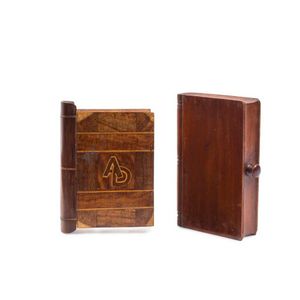19th Century Thuya Wood Casket & Walnut Tea Box
Two boxes a Thuya wood casket and an inlaid walnut tea box, 19th century, a domed thuya casket with ebony stringing and brass strapwork to the ends, with finely engraved brass swing handles and the original purple silk lining, and; a fine tea box with a canted and sectioned lid, with outlined boxwood inlay and with cursive marquetry initials, the interior with two lidded compartments, height 16 cm, width 16.5 cm, depth 14 cm, and smaller
You must be a subscriber, and be logged in to view price and dealer details.
Subscribe Now to view actual auction price for this item
When you subscribe, you have the option of setting the currency in which to display prices to $Au, $US, $NZ or Stg.
This item has been sold, and the description, image and price are for reference purposes only.
- Boxwood - Boxwood is a hard, yellow coloured, close grained timber. In the 19th century it was often used for inlays, especially stringing, because of its contrasting colour to the darker timbers of the carcase. Stringing is the inlay of a narrow strip of veneer of a lighter colour, such as boxwood along or close to the edges of an object that has been veneered in a darker timber such as mahogany.
Because of its fine grain and resistnce to splitting or chipping it has also been used for treen, turnings, carvings and other small wooden items, such as chess pieces. - Ebony - Ebony is a close grained timber, black in colour. It has a fine texture which can be polished to a high gloss, making it suitable for venereering, inlay and stringing and its use as solid timber is resticted to small decorative items and ornamental decoration, such as chess pieces and musical instrument parts. The term "ebonised" means "faux ebony", timber that has been darkened during the polishing process to resemble ebony.
Visually similar items

Two Australian book boxes, cedar, blackwood, huon pine, myrtle and pine, 19th century 18 cm and 19 cm high
Sold by
in
for
You can display prices in $Au, $US, $NZ or Stg.

A Victorian brass bound walnut writing box, 40 cm wide, 25 cm deep, 18 cm high
Sold by
in
for
You can display prices in $Au, $US, $NZ or Stg.

A huon pine travelling chest, Australian, circa 1850, 45 cm high, 122 cm wide, 45 cm deep
Sold by
in
for
You can display prices in $Au, $US, $NZ or Stg.

An early 20th century Arts & Crafts wrought iron mounted oak chest, with a hinged cover, applied with stylised foliate iron mounts, flanked by loop handles, 49 x 39 x 36.5 cm
Sold by
in
for
You can display prices in $Au, $US, $NZ or Stg.
